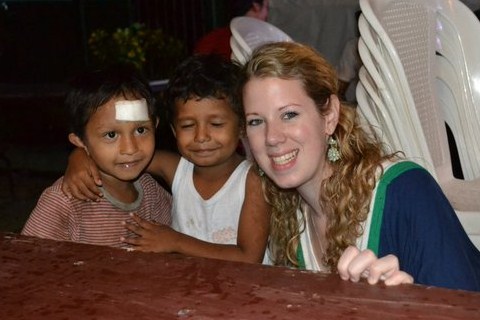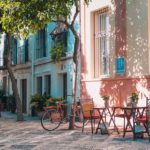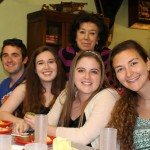Bridging the Gap Between Me and a Native Spanish Speaker

Out of place: That’s how I felt when I first got to Nicaragua.
In Nicaragua the people looked at me differently. At the beach a little girl told me I was ugly because my hair was blonde. A little boy at the school in La Ceiba pointed out the differences in our skin colors. A man driving a pickup truck yelled at me to get off the street.
Here I was, this very pale, very blonde, very young, American female surrounded by individuals with dark hair and skin. I did not have anything in common with them, or so I thought. I was a foreigner in this vibrant culture, an unusual sight to many of the citizens of León. People made their interest in me very obvious. The men stared and called me beautiful. The children watched in awe as I walked by. Suddenly, I was forced to look around at this new part of the world, and realize that, physically, I did not fit in.
Over the time I spent in Nicaragua, I became very aware of my appearance. I never felt like this at home in the United States, where the way I look seems both common and normal. Despite the looks and gestures about my hair and skin, one thing became very clear to me; all of these comments were made to me in Spanish, and I comprehended every word. The Spanish language was one that I had always found beautiful, but had only ever understood as an academic discipline. I never thought of it as a means of communication.
I had only ever considered language as a tool; as a way to get a point across.
Over the course of the trip I translated from Spanish to English for a few of the boys I traveled with. Translating, though somewhat exhausting, was completely satisfying. I was no longer simply bridging the gaps between myself and a native Spanish-speaking Nicaraguan, but I was helping to bridge the gaps for my friends as well.
Admittedly, my Spanish is nowhere near perfect; it is just strong enough to use in simple conversation with the native population. I soon learned that communicating, especially with the host family we stayed with, was really only half spoken-word. The other half was what I felt and thought as each “r” rolled off the tip of my tongue or as I occasionally mispronounced vocabulary words I had only ever seen on flashcards in a classroom.
I had only ever considered language as a tool; as a way to get a point across. But it was not until my host cousin, Mercedes, asked for my help with her English homework, that I realized knowing conversational Spanish could be so much more. She handed me a small notebook with Spanish sentences scrawled onto one side of a page and on the opposite side, she was expected to write the English equivalent. I found it easy to explain to her what the English translations were, and why the verbs fell in a certain formation. I did not need much focus to help her.
It was strange how easily my brain shut down and I ignored the language barriers all together and just let the words flow out of my mouth. I felt like we were speaking this indistinct language that both of us magically knew—that was the very moment that I realized that I was no longer translating. I was speaking.
I saw then, that it was not just me who felt it; that it wasn’t really at all about the language, it was about everything that went along with it.
I wouldn’t say my Spanish was fluent or perfect, but I was able to reach fluency in something else: the recognition of emotion. When I was helping Mercedes with her homework, part of my joy was seeing how happy she was that I could explain both sides of her assignment and that I could tell her how to spell things using the two different alphabets. It wasn’t the language that bonded us then, it was the emotion. I was able to understand and accept the feelings that ran through me as each word rang through my ears and each syllable escaped my lips.
As the sun rose on our last morning in Nicaragua and Ariel, my roommate and I stared at each other from our beds in our tiny violet room, I felt a sadness wash over me. I felt joy too though. I felt fulfilled, complete. I was at ease in this country that I never thought I would be able to relax in.
We rolled our suitcases out on to the street to be loaded on top of the school bus that would bring us to the airport in Managua. Our host mother, Ana, hugged us and a flow of Spanish came from her mouth. I made out most of the words. Something about having a safe trip back and that she would see us soon. Then words poured out of my mouth that I can just barely remember. I told her that I had two homes now; one in the United States, and one in Nicaragua. Tears welled up in the corners of my eyes as I told her that I would always remember her and my new family.
I was too distressed to remember to translate for Ariel, but it seems that it was alright, because at that moment, what I think amazed and touched me the most, was that Ariel began to cry too. I saw then, that it was not just me who felt it; that it wasn’t really at all about the language, it was about everything that went along with it. And as much as I needed to translate for the people around me that week, I know now, that the most important things, like love, never need to be translated.








